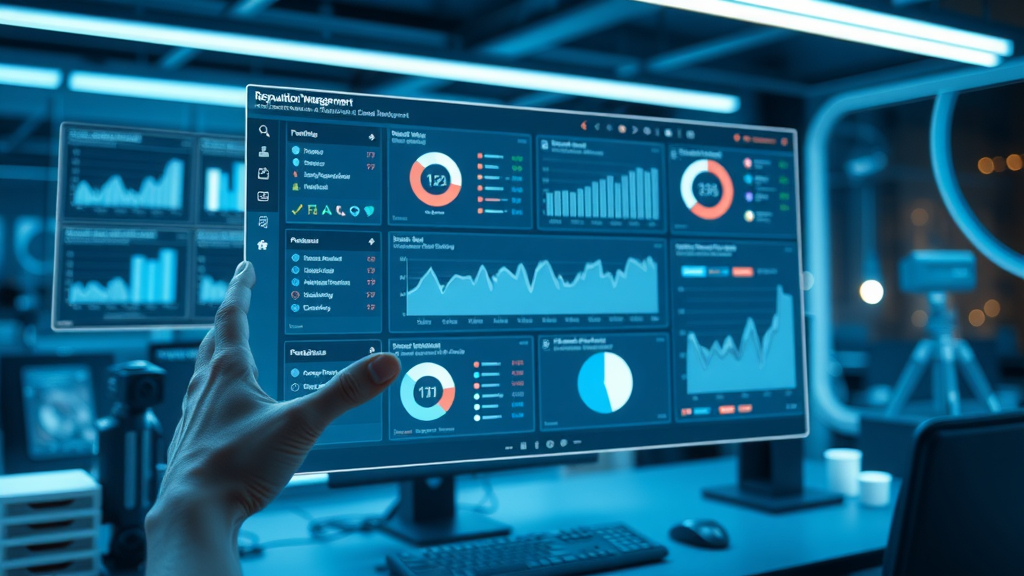- Did you know that 93% of consumers say online reviews influence their purchase decisions? In a hyper-connected era, a single negative mention can jeopardize a brand’s reputation within hours. Unveil the critical digital reputation tools that empower brands to monitor, manage, and protect their standing in the online marketplace.

Why Digital Reputation Tools Are Essential for Modern Brands
- Defining digital reputation tools and their increasing role in online reputation management
- Analysis of the impact of social media and online reviews on brand reputation
- Real-world examples of reputational crises averted with reputation management tools

In today's digital-first landscape, digital reputation tools have become a cornerstone of effective brand protection. Every comment, tweet, and online review can influence consumer perception and directly impact your bottom line. With the proliferation of social media platforms and dedicated review sites , modern brands face an ever-evolving threat landscape where a single negative review can swirl into a full-blown PR crisis. As a result, organizations are turning to robust reputation management tools to track brand mentions, manage customer feedback, and rapidly respond to emerging risks. These tools monitor a vast ecosystem—including search engines , blogs, and niche forums—delivering real-time alerts so you can stay on top of your brand’s online narrative.
Take, for example, how a hospitality brand used a reputation monitor to identify negative posts about its customer service on social media. By responding promptly through a management platform, they not only resolved the issue but also turned a potentially viral complaint into a demonstration of superior customer support. In our ultra-connected world, adopting digital reputation tools isn’t an option—it’s essential brand defense.
What You'll Learn in This Guide to Digital Reputation Tools
- How to select the best digital reputation tools for your business
- Key features to look for in reputation management software and monitoring solutions
- Comparison of leading online reputation management tools and their pricing
- Understanding sentiment analysis and media monitoring for brand defense
Top 15 Digital Reputation Tools to Protect Your Brand
Comprehensive Online Reputation Management Platforms
- Overviews of Brand24, Reputation.com, Birdeye, Sprout Social, and Mention
- Strengths, pricing, and integration with social media and search engines

When it comes to comprehensive reputation management tools , platforms like Brand24 , Reputation.com , Birdeye , Sprout Social , and Mention stand out. These software suites offer end-to-end solutions for monitoring online reviews , managing your social media presence, and integrating with search engines to enhance brand visibility. For instance, Reputation.com’s management tool boasts automated feedback collection, in-depth analytics, and customizable reporting dashboards that allow brands to uncover actionable insights. Brand24 and Mention focus heavily on real-time brand mention alerts, pulling data from thousands of media platforms and forums. Sprout Social not only provides listening and publishing capabilities for social media platforms but also gives businesses the edge with collaborative team workflows.
These platforms usually base their pricing on features, number of profiles managed, and data depth. While Mention is ideal for startups aiming for agile online reputation monitoring , Reputation.com and Birdeye are geared toward enterprise brands demanding advanced management software, text analytics, and seamless integration with review sites, making them powerful allies for those seeking holistic online reputation management.
Advanced Reputation Management Software and Monitoring Solutions
- Features of NetReputation, Yext, ReviewTrackers, and Podium
- Focus on automated review management and sentiment analysis
For brands requiring more specialized solutions, advanced digital reputation tools such as NetReputation , Yext , ReviewTrackers , and Podium deliver sophisticated features like automated review management and robust sentiment analysis . These software platforms help companies automate review collection, respond promptly to online feedback, and use AI to analyze the overall sentiment of customer reviews.
NetReputation, for instance, empowers brands to suppress negative content on search engines and manage third-party profiles, while Yext streamlines business information across hundreds of directories to enhance both visibility and trustworthiness. Podium and ReviewTrackers excel in generating new positive reviews through automated SMS and email campaigns that encourage real-time customer feedback. This means businesses have tools to transform customer experience data into actionable improvements and improved rankings in local search results.
What sets these management software options apart is their agile integration with CRM systems, their ability to aggregate reviews from multiple media platforms , and their detailed analytics—which are particularly useful for identifying patterns in customer sentiment. This allows brands not just to monitor, but truly manage, their reputation and online presence proactively.
Social Media Monitoring & Brand Mention Management Tools
- How Hootsuite, Brand24, and Sprinklr offer robust reputation monitoring
- Detecting brand mentions, negative sentiment, and viral discussions in real time

Social media management tools such as Hootsuite , Brand24 , and Sprinklr have redefined the landscape of reputation monitoring . These platforms excel at real-time detection of brand mentions , tracking viral topics, and identifying negative sentiment before it snowballs into a broader crisis. Whether you’re a small business or a global brand, integrating these tools ensures you can stay on top of customer perception across millions of daily interactions.
Hootsuite, for example, is a powerhouse for scheduling, publishing, and listening on a variety of social media platforms , making it possible to respond within moments of a brand mention. Sprinklr boasts AI-powered detection for high-risk keywords, as well as customizable alerts and workflow management tailored to multi-location brands. Brand24 stands out for delivering granular sentiment breakdowns and highlighting influencers driving brand conversations.
By leveraging these social listening and monitoring platforms, brands can keep their fingers on the pulse of public opinion. This proactive approach enables rapid engagement with customers, the ability to head off misinformation, and a foundation for building a consistently strong brand reputation .
Specialized Review Management Tools for Positive Reviews
- Highlighting Trustpilot, Grade.us, and ReviewPush for managing online reviews
- Strategies for driving positive reviews and addressing negative feedback
Pure-play review management tools, including Trustpilot , Grade.us , and ReviewPush , are designed for one central purpose: cultivating more positive reviews and managing your business reputation on major review sites. These platforms let brands automate requests for reviews via email or SMS, consolidate feedback from multiple platforms, and flag emerging issues before they escalate.
Trustpilot, a globally recognized online review platform, enhances trust by offering transparent consumer feedback and dispute resolution services. Grade.us helps you streamline review generation campaigns, automate thank-you responses, and consolidate all reviews into a single dashboard for easy oversight. ReviewPush specializes in multi-location review tracking and team-based workflow assignment, making it easier to craft unified response strategies.
By actively driving customer feedback toward positive reviews and responding constructively to negative posts, businesses dramatically improve both search rankings and customer credibility—solidifying the critical role of strategic review management in brand defense.
Niche Reputation Monitor and Sentiment Analysis Tools
- Exploring tools for sentiment analysis and reputation monitoring tailored to specific industries
- Benefits for hospitality, healthcare, finance, and technology sectors

Not all businesses require a one-size-fits-all solution. Industry-specific digital reputation tools for hospitality, healthcare, finance, and tech provide granular insights tailored to unique challenges. These sentiment analysis and reputation monitor platforms help brands interpret emotion in customer feedback, identify crisis triggers, and deliver specialized reporting for regulatory compliance.
In healthcare, management software must filter for sensitive patient data and follow strict privacy regulations, making tools like Hootsuite's healthcare suite or Reputation.com's health modules essential for monitoring and managing reviews safely. Hospitality brands benefit from platforms that integrate with booking engines and travel sites, such as ReviewPro, to stay on top of guest satisfaction trends. Finance and technology companies turn to solutions with enhanced security and automated anomaly detection, helping prevent reputation damage from fraudulent reviews or breaches.
By choosing a reputation management tool tailored to their sector, organizations not only safeguard their online presence but also gain the metrics and automation needed to comply with industry demands and keep customers informed and engaged.
Key Features to Look for in Digital Reputation Tools
- Integrated social media and online review management
- Comprehensive sentiment analysis and brand mention alerts
- Customizable media monitoring and reporting dashboards
- Automation capabilities, scalability, and internationalization
| Tool | Key Features | Integrations | Pricing |
|---|---|---|---|
| Reputation.com | Social media management, review aggregation, sentiment analysis, automated alerts | CRM, Support, Search Engines | From $300/mo |
| Brand24 | Real-time monitoring, influencer detection, detailed analytics | Slack, Google Analytics, Facebook | From $49/mo |
| Sprout Social | Social media publishing, robust reporting, team collaboration | CRM, Support, Google My Business | From $99/mo |
| Yext | Business directory sync, review management, sentiment tracking | Google, Facebook, Business Directories | Custom pricing |
When selecting a digital reputation tool , prioritize solutions offering integrated social media and online review management . Real-time brand mention alerts and comprehensive sentiment analysis equip your team to detect risks early and act confidently. Look for customizable media monitoring dashboards, automation for recurring tasks, and the ability to scale globally as your brand grows.
Scalability is key as your brand expands across markets and platforms. Automation features—such as scheduling, AI-powered response templates, and integrated analytics—allow you to do more with fewer resources, ensuring your online reputation remains protected without overwhelming your team.
"You can’t control what people say about your business, but you can control how you respond and adapt – with the right reputation management tool." – Digital Marketing Expert
How to Build and Sustain a Positive Online Reputation Using Tools
- Crafting a proactive online reputation management strategy
- Automating customer review requests for steady positive reviews
- Responding rapidly to negative reviews and media mentions
- Using analytics from management tools to inform future PR decisions

A powerful reputation starts with a proactive approach. Deploy digital reputation tools to implement a management system that requests, tracks, and responds to customer feedback on a routine basis. Automated review campaigns, such as those enabled by Podium or Grade.us, encourage satisfied clients to share their experience, steadily growing your pool of positive reviews .
Responding rapidly to negative feedback is equally crucial. Management tools should be configured with automated alerts for negative brand mentions or customer reviews so your team can address concerns before they escalate. A transparent, empathetic response often diffuses tension and may even prompt unhappy customers to update their reviews.
Finally, use in-depth analytics provided by your management software to spot recurring issues, highlight satisfied users, and refine your digital PR strategies. By making data-driven decisions, you can ensure reputation management isn’t just reactive, but a central pillar of your growth strategy.
Harnessing Social Media for Reputation Management and Brand Growth
- Utilizing listening tools for real-time brand reputation monitoring
- Leveraging social engagement for brand reputation enhancement
- Case studies: Businesses that mastered their online reputation via social media

Social media platforms have become the beating heart of brand reputation management. By deploying advanced listening tools like Sprout Social or Hootsuite, you gain immediate insight into what customers are saying, sharing, and trending. These dashboard-driven tools offer real-time reputation monitoring and can flag viral issues before they spiral.
Consistent engagement—responding to comments, thanking users for praise, and addressing questions—builds community trust and enhances your brand image. Many brands, such as innovative direct-to-consumer startups, have leveraged this approach to turn even negative conversations into brand-building moments.
For example, a beauty brand regularly tracked brand mentions and negative feedback on Twitter using media monitoring tools. By respectfully engaging and demonstrating product improvements, they not only defused backlash but also transformed critics into ambassadors—proving the transformative power of social media management and rapid digital reputation response.
Reputation Management vs. Reputation Monitoring: What’s the Difference?
- Defining management tools versus monitoring tools
- How to integrate both to create a unified reputation management system

Reputation management tools and reputation monitoring tools serve distinct but complementary roles. Monitoring tools focus on data collection—tracking brand mentions , trends, and emerging risks across media platforms and social media platforms . These tools notify you instantly when your brand is mentioned or when sentiment shifts, providing the foundation for swift action.
In contrast, management tools go a step further—streamlining responses, enabling review generation campaigns, and managing brand resources. They often include workflow automation, allowing for team coordination in addressing customer issues or launching positive campaign pushes.
Successful brands integrate both: leveraging monitoring tools to gather comprehensive intelligence, then employing management platforms to respond, resolve, and actively shape the conversation. Building a unified system is the foundation of modern online reputation management .
Understanding Sentiment Analysis and Its Role in Online Reputation Management
- How sentiment analysis tools identify trends in online reviews and social chatter
- Applying sentiment data to optimize crisis response strategies

Sentiment analysis is the engine that powers modern reputation management software. By using advanced language processing, sentiment tools comb through mountains of online reviews , social media posts, and articles to determine whether conversations about your brand are positive, negative, or neutral.
This immediate feedback enables organizations to spot brewing issues and strength areas at a glance. For example, if sentiment analysis software detects a spike in negative feedback after a product update, your PR team can quickly coordinate a response, mitigating backlash before it spreads.
Applying sentiment data strategically can inform product development, refine customer support training, and optimize future communications—making it a must-have feature for any forward-thinking online reputation management tool .
Maximizing the ROI of Reputation Management Software and Tools
- Calculating the impact of improved online reputation on revenue
- Efficient workflows using management software integration
- Extracting holistic insights from data dashboards
Investment in digital reputation tools yields measurable value. A healthier online reputation translates directly to higher trust, more positive reviews , increased customer acquisition, and improved search engine rankings. Studies show that even a single-star increase in review ratings can boost revenue by up to 9% for some businesses.
With modern management software , teams use automated workflows to assign and resolve tasks, reducing time spent on manual monitoring and freeing up resources for strategic growth initiatives. The best management platforms offer interactive dashboards, making it easy to extract holistic performance data and adjust tactics accordingly.
Ultimately, digital reputation management is not just a defensive measure—it's a high-return investment in brand equity, customer loyalty, and long-term business growth.
Industry-Specific Insights: Digital Reputation Tools for Different Sectors
- Best management software for hospitality and travel brands
- Healthcare-specific reputation management tool features
- Technology and finance industry requirements for reputation monitoring
Each industry faces unique challenges in defending its online reputation . For hospitality and travel brands, review management platforms like ReviewPro and TrustYou gather reviews from hotel sites, travel agencies, and booking engines, offering actionable insights to elevate guest experience.
In healthcare, privacy regulation is paramount. Tools like Reputation.com offer modules that anonymize identifiable information and ensure compliance with HIPAA, making them crucial for hospitals and clinics. Sentiment analysis in this sector helps quickly flag regulatory or patient safety complaints for rapid resolution.
Tech and finance industries benefit from software with advanced anomaly detection, secure integrations, and fraud monitoring features. Choosing the right digital reputation tools for your sector means aligning your management approach with regulatory demands and reputation risks, ensuring comprehensive coverage and peace of mind.
Challenges in Managing Online Reputation and How to Overcome Them
- Handling fake reviews and spam efficiently
- Navigating international reputation management complexities
- Building a resilient brand reputation amid evolving digital threats

One of the most persistent challenges in online reputation management is the prevalence of fake reviews and spam that can distort perceived brand quality. The best reputation management tools use AI to automatically flag suspicious feedback, streamline the dispute process with review sites, and provide detailed audit trails for transparency.
Globally active brands must contend with international language barriers, diverse review sites, and region-specific regulations. Scalable management software with multilingual support and localization features ensures your team can monitor and respond to feedback in every key market.
With the ever-increasing sophistication of digital threats—from organized smear campaigns to data breaches—staying ahead of online reputation risks requires a resilient, adaptive strategy supported by the right digital reputation tools and vigilant brand monitoring.
Top Strategies to Get More Positive Reviews with Digital Reputation Tools
- Tactics for encouraging customers to leave positive feedback
- Automated review management campaigns and their success rates
- Spotlight on businesses thriving after improving their online reviews
Securing more positive reviews begins with a simple, seamless feedback experience. Use review management software to automate outreach after purchases, reminding happy clients to share their experience on priority review sites. Incentives like discounts or loyalty points can further boost participation without violating platform guidelines.
Automated review campaigns, driven by platforms like Podium and Grade.us, have been shown to double or triple review volume while maintaining high star ratings. Coupling these tools with a best-practice workflow—thanking every reviewer, personalizing responses, and engaging with feedback—results in both review growth and enhanced brand authenticity.
Many businesses have transitioned from reputation struggles to market leaders solely by leveraging these strategies—turning the tide on negative perceptions with steady streams of social proof and customer advocacy.
People Also Ask: Essential Questions About Digital Reputation Tools
What are digital reputation tools and how do they function?
- Explanation of digital reputation tools as software or platforms designed to monitor, analyze, and influence a brand’s online presence across reviews, social media, and other digital platforms.
Digital reputation tools are specialized software platforms that help brands keep track of their online reputation by collecting brand mentions , customer reviews , and social chatter in real time. Functionally, they use algorithms and APIs to pull data from review sites , social media platforms , forums, and news outlets, presenting the results in dashboards. Brands can then analyze sentiment, identify trends, and respond directly within the platform, taking control of their digital narrative.
How do I choose the right reputation management tool for my business?
- Steps to assess business needs, must-have features (sentiment analysis, social media integration), and vendor support.
Choosing the best reputation management tool starts by identifying your priorities: Do you need advanced sentiment analysis ? Is integration with multiple social media platforms critical? Make a shortlist of vendors offering these features, then evaluate based on user interface quality, customer support responsiveness, scalability, and pricing models. Always request a demo and look for real-life case studies that match your industry.
Can digital reputation tools remove negative reviews?
- While tools can't outright remove reviews, they can alert businesses to issues, streamline response, and encourage new positive reviews to outweigh the bad.
Digital reputation tools cannot directly remove negative reviews from third-party sites. However, they excel at alerting you as soon as a negative post appears, allowing you to respond promptly with empathy and factual information. Over time, the focus shifts to generating enough positive reviews through proactive campaigns, effectively burying negative feedback and improving your overall star rating.
How do reputation monitoring and management differ?
- Monitoring involves tracking mentions, sentiment, and trends online; management includes taking action to address, repair, and enhance reputation proactively.
Reputation monitoring is all about surveillance—continually scanning the digital landscape for new mentions, reviews, and sentiment shifts. Reputation management , on the other hand, is proactive: it means using those insights to guide decisions, engage with the public, resolve complaints, and launch campaigns that defend or boost your brand image.
Best Practices for Integrating Digital Reputation Tools into Your Business Strategy
- Tips for seamless integration with CRM, customer support, and marketing automation systems
- Training teams to leverage management software data for rapid decision-making
For maximum effectiveness, integrate digital reputation tools directly with your CRM, support portals, and marketing automation software. This lets you automatically assign feedback tickets, prioritize response to high-risk incidents, and launch review requests as part of your customer journey. Consistent staff training is essential so teams can interpret dashboard data, respond in brand voice, and escalate critical issues swiftly.
Create step-by-step SOPs for using management software to ensure every review and mention is handled efficiently. Regularly review integration logs for errors and update connections as new features are released, advancing both customer satisfaction and operational agility.
Expert Tips for Maximizing the Impact of Digital Reputation Tools
- Establishing reputation monitoring routines
- Setting alerts for high-risk keywords or negative sentiment spikes
- Regularly analyzing reports to track progress and ROI
Establish a daily routine of checking your reputation monitoring dashboard first thing each day. Set high-priority alerts for emerging negative trends, competitor activity, or spikes in brand conversation volume. Parse weekly and monthly reports to identify patterns and inform future campaigns.
Encourage your team to contribute insights and act swiftly on new data. By cultivating a culture of vigilance and responsiveness, you can turn every piece of feedback—positive or negative—into an opportunity for brand growth.
"A brand is no longer what we tell the consumer it is—it is what consumers tell each other it is." – Scott Cook, Intuit Co-Founder
Frequently Asked Questions About Digital Reputation Tools
- What’s the estimated cost range for reputation management software?
- Are online reputation management tools suitable for small businesses?
- How quickly can reputation monitoring tools detect a crisis?
- What integrations are available with modern management software?
What’s the estimated cost range for reputation management software? Pricing starts at around $30/month for basic monitoring tools and can exceed $500/month for enterprise-level analytics and multi-location management features.
Are online reputation management tools suitable for small businesses? Absolutely! Scalable options with affordable pricing tiers and easy-to-use dashboards make them perfect for small and midsize businesses seeking to protect and enhance their online reputation .
How quickly can reputation monitoring tools detect a crisis? Most tools offer real-time monitoring and instant alerts, ensuring you can be notified within minutes of a negative mention or review surfacing online.
What integrations are available with modern management software? Leading solutions offer integrations with CRM systems, customer support desks, marketing automation tools, and API access for custom connections to third-party apps.
Next Steps: Elevate Your Brand with Top Digital Reputation Tools
- Recap of why proactive use of digital reputation tools secures brand reputation against online risks
- Encourage readers to take action—evaluate and integrate management tools as a central component of their business strategy
Proactive investment in digital reputation tools equips your brand to withstand online threats, foster customer trust, and capitalize on every digital opportunity. Integrate these platforms into your core business processes—today—and safeguard your reputation for the long haul.
Ready to Protect Your Business?
- Schedule a Free Strategy Session Today! https://hub.prospectrocket.com/AR/eymcalendar
To enhance your understanding of digital reputation tools, consider exploring the following resources:
-
“8 Tools to Effectively Monitor Your Brand’s Reputation Online” : This article provides an overview of top tools like Google Alerts, Brand24, and Hootsuite, detailing their features and how they can help in monitoring and managing your brand’s online presence. ( name.com )
-
“Best Online Reputation Monitoring Tools - In-Depth Review” : This comprehensive review delves into various reputation monitoring tools, offering insights into their functionalities, strengths, and suitability for different business needs. ( quicksprout.com )
These resources offer valuable insights into selecting and utilizing digital reputation tools to safeguard and enhance your brand’s online presence.
 Add Row
Add Row  Add
Add 




Write A Comment